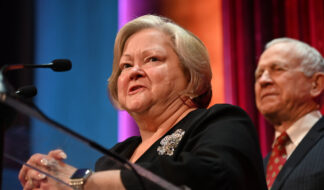Family Research Council Calls Self ‘Church.' This Michigan Rep Obviously Calls Bullsh*t.
When is a church not a church?

In an outrageous move that strains credulity — and just plain common sense — the Family Research Council (FRC) has obtained "church" status with the IRS.
Specifically, they claim to be an “association of churches,” a category often used by organizations with member churches like the Southern Baptist Convention. In a nutshell, this means less oversight involving the financial dealings of the far-right think tank, designated a hate group by the Southern Poverty Law Center. To be sure, with its anti-LGBTQ+ and anti-reproductive rights agenda, this is one “family” that’s hell-bent on keeping its secrets.
“A number of my colleagues became aware when groups like Family Research Council reclassified themselves as a church, even though they don't have religious service or a congregation,” said Rashida Tlaib, who, along with about 40 other Congressional Democrats, signed a letter directed to the IRS and the Treasury Secretary asking them to review the tax-exempt status of FRC and other prominent conservative groups that have been classifying themselves as churches.
While the maneuver dates back to 2020, only recently have government officials taken notice. A minimum number of specific criteria must be met to earn the “church” label and the FRC has clearly bent the rules beyond recognition. The FRC is not alone engaging in this sleight of hand.
Tlaib said they became “aware and alarmed” that not only do these groups have less oversight, but as churches, they are tax-exempt. She pointed out that based on its “church” status, an organization is not required to file a Form 990, which details salaries of key staff members, among other things. There is no requirement to disclose information about donors. Further, the IRS audits churches less frequently than other entities.
“It was really important for us to make the IRS aware, but also to take a deeper dive into investigating whether or not they should be considered a so-called church just because they classify themselves as such,” Tlaib said. At the same time, she said, the letter makes clear they understand the importance of religious institutions.
“Religious freedom is a cherished American value,” emphasized Tlaib. “However, our tax laws cannot be used to target our LGBTQ neighbors or to promote very divisive and hateful rhetoric and to hide behind these tax laws. It really does exploit our current laws and avoids accountability in a way that I think the general public would definitely not be in support of."
“If you're an organization that supports targeting and harming LGBTQI and you're against a certain policy or access to healthcare, then exist as is,” she added, issuing a challenge to come clean. "But don't hide behind saying that you're a religious institution when you don't have church services nor do you have an actual church facility or a congregation.”
Jay Kaplan is the staff attorney for the ACLU of Michigan’s LGBT Project. He too is alarmed.
“I think it's in the public interest to know who's providing the financial support for organizations,” Kaplan said, “and on both sides of the spectrum. And might there be corporate interests that are funding some of the work that an organization like the Family Research Council is doing, just so people know? Information is always power.”
As an example, Kaplan cited the American Family Association. The organization had changed their status with the IRS, while continuing to engage in political activity.
“To me, personally, it sounds like you don't want to play by the rules,” Kaplan said, in reference to FRC and others. There's certain reporting requirements under the IRS and to try to skirt around that, I find disingenuous.”
Separately, the question of when to call an institution a church — and when to call BS — figures prominently in a very different way in west Michigan, where some say Kalamazoo’s Radiant Church is playing fast and loose with the tax code. That’s according to Erin Knott, executive director of Equality Michigan and a former Kalamazoo city commissioner.
In that case, a nondenominational megachurch that grew out of campuses in the Kalamazoo suburbs of Richland and Portage opened a location in downtown Kalamazoo, in what used to be a building that housed a restaurant and condominiums. Now, 4,000-member Radiant has expanded its footprint to include a music label and a coffee shop that is billed as the “front porch” of the church and is located on the Kalamazoo Mall.
“We want this to be the kind of place where people can come, feel very comfortable, get an amazing cup of coffee and hopefully it will lead to new things being birthed out of it,” Radiant Church executive pastor Rick Burmeister told MLive last year. As a nonprofit, the coffee shop boasts that they give back to the local community — partners include the anti-choice Alternatives of Kalamazoo and Kalamazoo Youth for Christ, which explicitly states they don’t discriminate in their proselytizing.
The affiliated businesses pay no property taxes, because they exist under the “umbrella” of Radiant. For practical purposes, this is critical because Kalamazoo’s tax base is lopsided in that the majority of properties in the city are nonprofits.
“It's a little unclear to me if there are eight, 10 or 12 parcels,” Knott said. “But this church has gobbled up this building. As a former city commissioner and a taxpayer here in Kalamazoo, the impact of the Radiant takeover is alarming because it is located in the heart of downtown Kalamazoo in an area where our community has experienced a real challenge post-Covid as we're emerging out of the pandemic situation where restaurants have boarded up, businesses have gone under."
“It has also impacted the quality of life for LGBTQ+ individuals who no longer deem it safe to shop or go out to eat or to go to the art museum or to check out a show in downtown Kalamazoo because of the presence of this church,” she added.
The solution, Knott said, is for the current city commission to ask or demand the city’s assessor audit “every last square inch of the space,” because if they’re not doing business directly with the church, their tax status is in question. The next step would be to take the complaint to the IRS.
As a cautionary tale, Knott cited Redding, California. The membership of Bethel Church, established there in the 1950s, now exceeds more than 10 percent of the city’s population of 90,000 residents. The church publicly opposes bills that would ban conversion therapy and a church leader came out against the Equality Act.
Back in Kalamazoo, Knott said supporters of the LGBTQ+ community recently vandalized Radiant. And stickers that say “Stop the colonization of downtown Kalamazoo by Radiant” have appeared around town.
“I think that there are more effective ways in which to express concern and public outcry,” Knott said. Still, the extreme measures got people talking.
Tlaib stressed that any organization has the right to exist in this country. But she has a warning for FRC and others like them: “Don't hide behind tax laws,” she said. “Don't hide behind those laws so that you don't have oversight. We want to protect true religious freedom in our country.”









